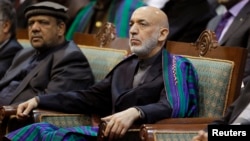Afghan President Hamid Karzai is continuing to say that he will wait until his country's presidential election in April before signing a security pact with the United States.
In an interview with U.S.-funded Radio Free Europe-Radio Liberty that aired Wednesday, Karzai said the agreement was in the best interests of his country. But he said the U.S. must first end raids on Afghan homes and help jumpstart a stalled peace process with the Taliban before he would sign the pact.
"I have demanded an end to all American attacks against Afghan homes and the beginning of a realistic peace process. Whenever the Americans meet these two demands, I am ready to sign the agreement. And when these two demands are implemented, the pact is in Afghanistan's interests," he said.
Karzai also reiterated the United States must not interfere in Afghanistan's presidential election on April 5.
The Afghan leader appeared to have slightly scaled back his demand that the U.S. guaranteed the April election be free and fair following assurances he received during a Monday meeting with U.S. National Security Adviser Susan Rice.
In a separate interview with Afghanistan's TOLO television, Rice said Karzai must sign the bilateral security agreement by the end of this year, or the U.S. would have no choice but to withdraw all troops after 2014.
Karzai appeared unfazed by the U.S. threat.
"It is up to the Americans whether they want to stay or go. Even if we sign a thousand agreements with them, if it doesn't suit their interests they will leave -- just as they left Afghanistan alone in the 1990s during the years after jihad," said the Afghan president.
Afghanistan's grand assembly, or Loya Jirga, has urged Karzai to immediately sign the pact, which calls for some U.S. troops to stay in Afghanistan after 2014 to help the government in its war against the Taliban.
The security agreement would take take effect January 1, 2015. All international combat forces in Afghanistan are set to withdraw by the end of 2014.
Radio Free Europe and Radio Liberty are both funded by the U.S. government under the Broadcasting Board of Governors, which also oversees the Voice of America.
In an interview with U.S.-funded Radio Free Europe-Radio Liberty that aired Wednesday, Karzai said the agreement was in the best interests of his country. But he said the U.S. must first end raids on Afghan homes and help jumpstart a stalled peace process with the Taliban before he would sign the pact.
"I have demanded an end to all American attacks against Afghan homes and the beginning of a realistic peace process. Whenever the Americans meet these two demands, I am ready to sign the agreement. And when these two demands are implemented, the pact is in Afghanistan's interests," he said.
Karzai also reiterated the United States must not interfere in Afghanistan's presidential election on April 5.
The Afghan leader appeared to have slightly scaled back his demand that the U.S. guaranteed the April election be free and fair following assurances he received during a Monday meeting with U.S. National Security Adviser Susan Rice.
In a separate interview with Afghanistan's TOLO television, Rice said Karzai must sign the bilateral security agreement by the end of this year, or the U.S. would have no choice but to withdraw all troops after 2014.
Karzai appeared unfazed by the U.S. threat.
"It is up to the Americans whether they want to stay or go. Even if we sign a thousand agreements with them, if it doesn't suit their interests they will leave -- just as they left Afghanistan alone in the 1990s during the years after jihad," said the Afghan president.
Afghanistan's grand assembly, or Loya Jirga, has urged Karzai to immediately sign the pact, which calls for some U.S. troops to stay in Afghanistan after 2014 to help the government in its war against the Taliban.
The security agreement would take take effect January 1, 2015. All international combat forces in Afghanistan are set to withdraw by the end of 2014.
Radio Free Europe and Radio Liberty are both funded by the U.S. government under the Broadcasting Board of Governors, which also oversees the Voice of America.





